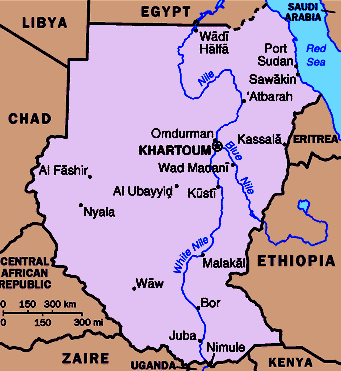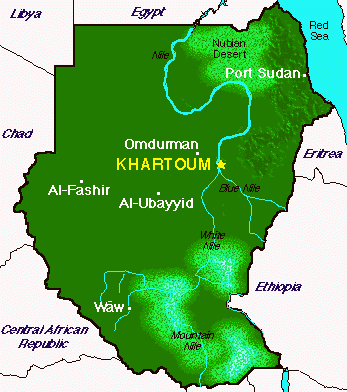
| ICE Case Studies
|
|
I.
Case Background |
In late 1997, the US Congress passed into law a bill that placed economic sanctions on the country of Sudan. The United States decided to punish the Sudanese government, which the State Department declared is a "sponsor of terrorism and a relentless oppressor of its minority Christian population." The original bill was meant to terminate all commercial activities between the two countries, however, this did not come to fruition. Though the Sudanese government has no active lobby in this country, while the bill made its way through committee, several lobbying groups made a sudden appearance and opposed outright passage of the bill. They did not oppose the sanctions as a whole, they took issue on the possible sanction of only one product, gum arabic.

A substance that very few are aware of, but one that almost all Americans have come in contact with. Gum arabic, a derivative of the acacia tree, is an important ingredient in various products ranging from soda and candy to pharmaceuticals. Gum arabic's applications are wide spread, some typical applications are acting as an emulsifier, flavoring agent, and thickener in both food and pharmaceuticals. Gum arabic is also used in the newspaper and magazine printing process, allowing ink to better stick to the paper while keeping it from smearing, as well as protecting the printing plates from oxidation.
Gum arabic is used by a number of industries. When the companies that rely on it heavily realized that their primary source of gum arabic was about to be cut off, the lobbying groups that represent those US companies sprung into action � Nigeria, Chad, Cameroon, and Mexico also export gum arabic, but Sudan is by far the largest exporter. The result of the lobbying efforts was an exemption placed on gum arabic allowing companies to apply for a license which permits them to import gum arabic from Sudan.
In August 1998, the attention of Congress was again drawn to the economic sanctions placed on Sudan, due to an alleged relation of suspected terrorist financier, Osama bin Laden, to many Sudanese companies - including the Gum Arabic Company, one of the leading exporters of gum in Sudan. However, most US companies claim that if there is indeed a relationship between Sudanese gum arabic exporters and Mr. bin Laden, they will cease all trade relations with those companies.
The reason why there is such a flap over gum arabic is because it is plentiful in Sudan; in fact gum arabic exports from Sudan compose 70 to 90 percent of the world's supply. The US alone imports 4,000 to 5,000 tons of gum arabic from Sudan, approximately US$9 million a year. In 1995, Sudan exported about US$54 million of gum arabic about 11 percent of its total exports that year.
Continent: Mideast
Region: Africa-Mideast
Country: Sudan

The loss of Sudan's gum arabic trade could also have adverse affects on its environment. Only 5% of the land in Sudan is arable, and everyday more and more forest land is being cleared to meet expanding mechanized farming needs as well as increasing needs for fuel wood. However, the acacia tree has been spared and well regenerated, due to its lucrative nature. If the tree were to loses its value as an export, it too may suffer the same fate as other forests throughout Sudan.
However, a continuing gum arabic trade in Sudan could also have adverse environmental impacts. Already the lucrative gum arabic trade has moved growers toward cultivating a uniform strand of A. Senegal � considered to be the source of the best quality gum arabic. Are there ecological implications to the removal of other species of the acacia tree and replacing them all with a single species? Will having only a single species of tree in a region adversely affect the soil composition and perhaps alter the soil's ability to support the desired species?
Due to the importance of gum arabic as an export, companies have gone to great lengths to ensure the survival of the acacia trees. "The greatest challenge has been to maintain enough people close to the trees that are to be tapped and harvested." Part of this challenge is supplying food, water, and other supplies to the workers in the forests. Water from the Nile River is usually brought in using tanker trucks. Some companies are also funding projects to build wells and pumps in the key acacia tree regions. Although it is difficult to supply water to the workers, it is not likely that bringing water from another region will have any real environmental effects. But will the migration of workers to the harvesting areas have an advers effect on the tree's environment?



IV. Environment and Conflict Overlap
1. Thomas W. Lippman, "Sudan trade ban gets gummed up," The Washington Post, 16 October 1997, URL: http://archives.seattletimes.com. 2. Laurence Arnold, "Bin Laden's control of gum market worries US industry," National World News, 25 August 1998, URL: http://archives.seattletimes.com. 3. Basic Country Facts from ArabicNews.com, URL: http://www.arabicnews.com. 4. Paul Merrion, "Sudanese import ban threatens to gum up works for local firms," Crain's Chicago Business, 17 November 1997, URL: http//www.usaengage.org. 5. George Gedda, "Lobbyists win sanctions victory for Sudanese gum arabic," The Associated Press, URL: http://www.nando.net. 6. URL: http://www.odci.gov. 7. URL: http://www.redbay.com 8. URL: http://www.hort.purdue.edu/newcrop/duke_energy/Acacia_senegal.html 9. "Sudan: Understanding the Conflict: Predatory Economics," World Vision US, URL: http//:www.worldvision.org
